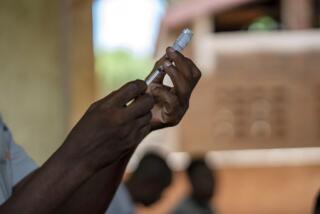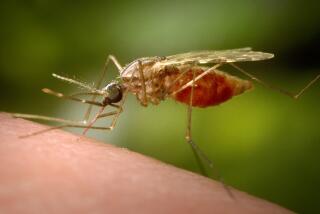Malaria Test Vaccine Is Hopeful
- Share via
Scientists reported encouraging results Thursday in the first human tests of an experimental vaccine that fights a malaria-causing parasite at the stage when it infects red blood cells.
Studies in young men found that the experimental inoculation delayed or suppressed the development of the disease, Colombian scientists reported in Thursday’s issue of the British journal Nature.
Last year, other scientists reported partial success for a malaria vaccine that attacks the parasite at an earlier stage, when it is injected by mosquito bites.
While malaria is not a major disease in the United States, it strikes an estimated 300 million people each year worldwide.
The Colombian scientists said their human work followed experimental success in monkeys that were injected with the malaria parasite, Plasmodium falciparum .
They experimented in humans with two proteins to spur the immune system to raise defenses against the parasite in its blood-cell stage. Nine volunteers were injected two or three times with one or the other, while four more were given no inoculation.
The volunteers were also injected with red blood cells infected with the malaria parasite.
Three of the five volunteers who got one protein had mild infections, but with a steady decrease in parasite counts and total recovery by three weeks. Another showed no protection, and the fifth left the study early.
Two of the four volunteers vaccinated with the other protein showed partial control of the infection for about two weeks.
More to Read
Sign up for Essential California
The most important California stories and recommendations in your inbox every morning.
You may occasionally receive promotional content from the Los Angeles Times.













